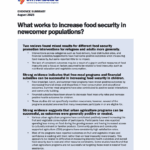Low-income children’s access to meals decreases during the summer months due to losing the benefit of the free and reducedprice lunches they normally receive during the school year. Few studies critically examine community-based approaches to providing summer meals. This mixed methods study examined a mobile meal program implemented in a community with large economic disparities. Parents and caregivers who attended the mobile meal program with a child at one of three sites completed surveys that screened for risk of food insecurity and examined access and utilization of community food resources. Interviews with a representative subsample of English- and Spanish-speaking participants elicited an in-depth understanding of food insecurity in the community and perspectives on the mobile meal program. Surveys (n = 284) were completed in English (78%) and Spanish (22%). Participants identified primarily as Asian (32%), Latino/Hispanic (29%), and White (27%), with 26% screening positive for risk of food insecurity within the past 12 months. Qualitative interviews (n = 36) revealed widespread support for meals served in public settings as they were perceived to be welcoming, fostered social interactions, and helped the community at large. Participants described the high cost of living as a key motivation for participating and cited immigration fears as a barrier to accessing public resources. Findings from this study suggest the importance of innovative community-based approaches to serving hard-to-reach children during the summer.
A Systematic Review on the Impact of Trauma-Informed Education Programs on Academic and Academic-Related Functioning for Students Who Have Experienced Childhood Adversity
The purpose of this study was to conduct a systematic review of the existing literature regarding trauma-informed education programs and their impact on academic and academic-related outcomes. The articles included for review (n=15) contained data on trauma-informed education programs implemented in preschool, primary/elementary, and high school settings. Academic and academic-related outcomes reported included attendance, disciplinary…

